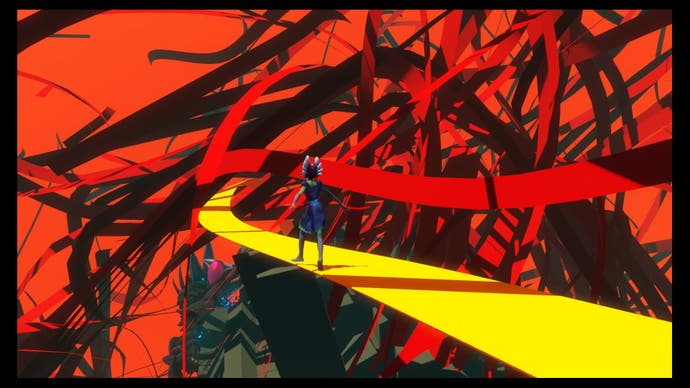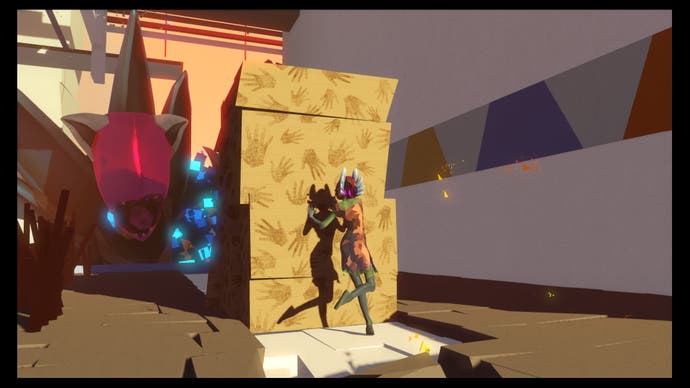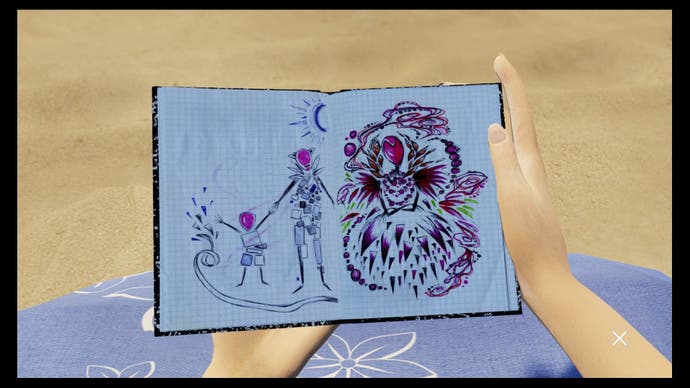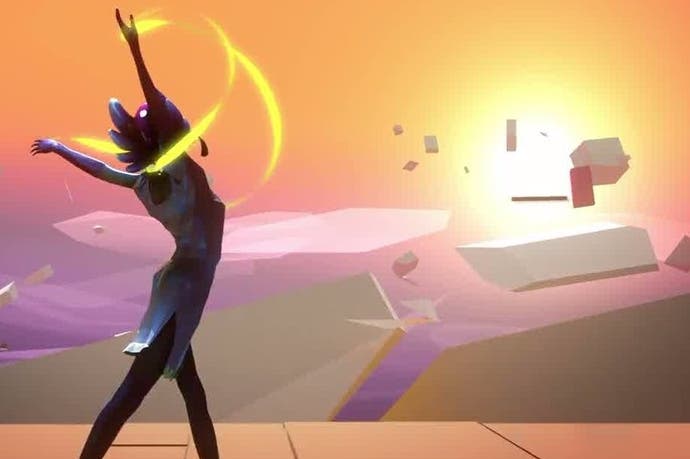Bound review
Inside I'm dancing.
All the Princess can do is dance, but while she dances she is untouchable. Tap X and she launches into a grand jeté, toes scissoring the air in a mesmerising reinvention of a ubiquitous video game action. Hit square to make her pirouette, or do it while running to execute a sinuous forward flip. Hold right trigger and the character twists, kicks, springs into a breathtaking extended bravura - an astonishing, fully motion-captured piece of contemporary ballet that had me laughing in delight the first time I beheld it in action. Such insistent style and grace in a medium where most character animations are cursory, subordinate to the needs of balancing or efficiency.
Not that these more involved displays are without a mechanical purpose. As arms undulate and ankles fly, ribbons snake from the ether to entwine the Princess's limbs and encase her performance in a defensive sphere - repelling or taming the paper arrows and geysers of clotted red tissue that trouble Bound's dreamy landscape. Her dance is a kind of catharsis, the transfiguration of deeply nursed anxiety into something beautiful and bewitching.

Bound is not, in fact, the Princess's story. It's the story of a woman in a blue dress we first encounter stepping onto a beach. In the course of the game's brief span - one to two hours or so, plus unlockable speedruns and a photo mode that lets you play around with effects and filters - she paces down the beach towards a house, pausing every few steps to gaze out over the waves and study a page from the sketchbook in her hands.
It is in these sketchbook pages that the Princess lives out her tale. Each drawing plunges you into a journey through a mythical world presided over by a Queen in ballooning skirts and stalked by a mysterious, screaming giant - a world that simmers incoherently at a distance, condenses underfoot in a swirl of lines and planes, then collapses behind you into a seething cuboid ocean. Your task in this tortured yet easily traversable realm is simply to reach the end of the path, where you'll discover a traumatic memory that must be pacified through the emotive sorcery of dance. Complete the performance and the page is torn from the book; the injury is exorcised; the woman resumes her slow progress towards the house. Oleg "Heinali" Shpudeiko's elegant score expresses the gap between realities with a mixture of worn, thudding piano and drifting, pulsing electronica.
The pages can be torn from the book in any order, and the dancing sections themselves are very open to interpretation - the depleted candlestubs of fairytales, capped with more direct, first-person explorations of scenes from childhood that must be salvaged from a cloud of billowing debris. This is, however, a game with an obvious and oppressive endpoint. The specifics of the plot may escape you, but the family dynamic under study is right there in the title.

It is intriguing to ponder whether this sense of an inescapable conclusion shapes, or merely echoes, the very limited range of things you're able to do in the game. The Princess's dance may be freeing, elevating, but once you (reluctantly) look past the flourishes, her moveset is essentially that of any platform game character - sprinting, wall rebounds, rope-climbing, shimmying along ledges, even block-pushing - and the levels afford precious little opportunity to explore, or even fail. Leap to your doom and the Princess will respawn on the precipice without penalty. There are collectibles to discover, though they're seemingly included just to guide your steps, and the odd hint at an environmental puzzle, such as a line of Christmas tree baubles with their own gravity, a la Super Mario Galaxy. But in most respects Bound is less a platformer than a playable fable that occasionally slips on the garments of a platform game.
To "strip away the flourishes" is, admittedly, to misunderstand the spirit in which Bound was developed, and possibly to judge it on prejudicial terms. Polish team Plastic is a veteran of the demoscene, an elite and reclusive development subculture that dates back to the 90s and devotes itself to hardware-pushing, abstract non- or partly interactive computing artworks - not videogames in the generally accepted sense, but statements and shows of proficiency under creative restraint. You might recall the team's console debut, PS3's Linger In Shadows, with its player-steered trail of darkness, flying tentacle mask and gigantic, dopey bloodhound.
That heritage burns brightly in Bound's spread of visual metaphors and in its fondness for minute technical ornament - everything from the way the unnamed woman's feet disturb the sand, to how the dream world's walls shudder back a little from the Princess's touch, as though in agony at the clarity she represents. It also comes across in the pointed lack of challenge, which extends to an optional edge guard feature that stops you walking off cliffs accidentally. The idea (as laid out in this Medium interview with Michal Staniszewski) is that players are able to drink in the sights and mull over thematic repercussions without having to worry about chores like pushing switches in sequence.

This isn't an unreasonable aim - far too many great video game fictions sabotage themselves by insisting that the player scamper through hoops in order to meet some hazy minimum standard of difficulty. In practice, though, Bound's loosely adopted platform mechanics merely tee up expectations it refuses to satisfy. There's real joy to be had in flexing the Princess's repertoire, with a different sequence of moves mapped to right trigger in every chapter, but the second you're asked to go anywhere the thrill fades. I came away wishing for a game constructed around dancing, around performer Maria Udod and the choreography of Michał Adam Góral, rather than an undecided genre piece to which dancing has seemingly been grafted after the fact.
I also came away wishing for a bit more hope. On one level, Bound is an account of somebody's fight to extricate themselves from a stifling patriarchal framework, an account that is at times very deft - I won't spoil anything, but the dialogue line "Because I could" speaks volumes in context. It ends with a decision that suggests the possibility of overthrowing the scenario, but which I found to be extremely bleak, a choice between two forms of subjection to a social institution.
To castigate Plastic on this count may be to bring too much of my own politics into the mix, however, and in any case it speaks well of the game that it can prompt such lingering, divided emotions. Life is messy. Perhaps such outcomes are the best we can hope for, in fiction and beyond. And in the meantime, there is the dance - not quite enough but peculiarly irresistible, an attempt to unify past and present for the future's sake, to shore up and transcend the things that pain us.

